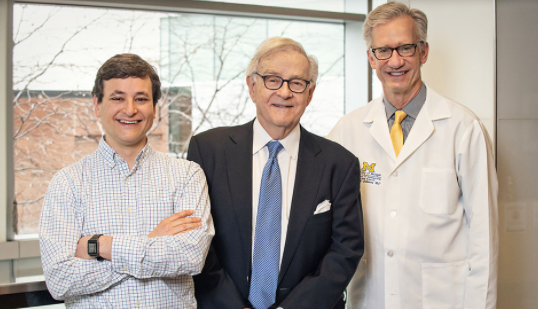U of M Kellogg Eye Center receives $11.5 million for AMD research
Gifted by philanthropist James Grosfeld, the money will fund the launching of a pioneering research initiative as one of the largest investments of resources in the United States.
The University of Michigan Health WK Kellogg Eye Center has received an $11.5 million gift toward the launch of a pioneering research initiative in the field of age-related macular degeneration (AMD).
The initiative was made possible by James Grosfeld, an investor, philanthropist, as well as former chairmen and CEO of PulteGroup, Inc.
From left to right: Jason M. Miller, M.D., Ph.D., James Grosfeld and Mark W. Johnson, M.D., at the University of Michigan Health W.K. Kellogg Eye Center.
Photo credit: Univesity of Michigan

The effort will be one of the largest investments of resources in the United States, targeted at developing effective AMD treatments and increasing discovery, collaboration, and leadership in the field, according to a University of Michigan Health news release.
As part of the gift, the following will be supported:
Establishment of two endowed professorships focused on dry AMD research.
Increased laboratory staffing to increase the pace of research.
Collaborative grants that will link dry AMD investigators with other Kellogg Eye Center experts and across the University of Michigan to bring new techniques and approaches to bear on the disease.
A pluripotent stem cell facility to create cells for use in dry AMD-related research across disciplines
Innovations in clinical research, including the collation of ophthalmic images to advance clinicians’ ability to track dry AMD progression
Pilot funding for proof-of-concept experiments and research grants for trainees who seek to bring new ideas and perspectives to dry AMD research
Leading the initiative will be James M. Miller, MD, PhD, the first James Grosfeld Professor of Ophthalmology and Visual Sciences. Miller specializes in retinal diseases and dry AMD research.
Miller’s research in the field has led to a hypothesis that improving the retinal pigment epithelium (RPE) handling of lipid (fat) will slow dry AMD progression. He and his team are working to understand how the RPE processes lipid.
“The Kellogg Eye Center and the University of Michigan have world-class faculty studying problems as diverse as diabetes and heart disease,” Miller said, in a statement. “The research tools and methods they use, when applied to dry AMD, will spark new discoveries about this devastating disease.”
Additionally, the initiative will also include University of Michigan experts in ophthalmic imaging, drug development, and clinical trials.